|
|
|
Sort Order |
|
|
|
Items / Page
|
|
|
|
|
|
|
| Srl | Item |
| 1 |
ID:
151836
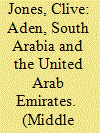

|
|
|
|
|
| Summary/Abstract |
Five decades after withdrawing its troops from Aden for the last time, the decision by the Government of Harold Wilson to abandon the Federation of South Arabia (FSA) and with it, the various tribal potentates that had aligned themselves with this project in state creation continues to generate vociferous debate. For some, any attempt to configure a modern state from a largely tribal field was doomed to fail as internecine conflict; regional rivalries punctured the illusion of a unified Federal identity, let alone a coherent state. For others, it was a lack of British political resolve as well as investment of the necessary treasure that forced the issue and saw London abandon erstwhile allies to an often bloody fate with the emergence of a Marxist-led regime in what became South Yemen after 1967. Yet just three years later, Britain oversaw the creation of the United Arab Emirates (UAE) from a collection of tribal entities, a state creation project that continues to endure. In a series of articles written by leading historians of the region as well as former diplomats, this issue of Middle Eastern Studies sets out to compare and contrast the circumstances and context surrounding the failure of the FSA with the establishment of the UAE, the legacy of which continues to shape the politics and security of the Gulf region in the twenty first century.
|
|
|
|
|
|
|
|
|
|
|
|
|
|
|
|
| 2 |
ID:
158949
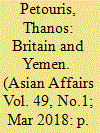

|
|
|
|
|
| Summary/Abstract |
This article publishes for the first time selections of the private correspondence (placing them in their historical context) of John G. T. Shipman (1939–2016), who took up his position as assistant adviser in the Eastern Aden Protectorate at the end of 1962 just as the first signs of political and social change were appearing in South Arabia. He served from this position in different parts of the Eastern Aden Protectorate until 1967. Shipman's correspondence allows for an unmediated appreciation of how people on the ground experienced the historical events at the time, including the British withdrawal in 1967, and highlights the extent of their own grasp of the goings-on when contrasted with the historical record. In this sense, the scope of this article is to allow the voice of one of the many British colonial officials to directly narrate their encounters during the last five years of British colonial rule over southern Arabia. The perceptive eye of a young political officer coupled with the ephemeral character of his handwritten correspondence, which providentially survived for more than five decades although it was never intended for publication, offers a fresh insight into the political and social life of the Eastern Aden Protectorate.
|
|
|
|
|
|
|
|
|
|
|
|
|
|
|
|
| 3 |
ID:
124173
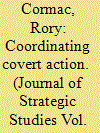

|
|
|
|
|
| Publication |
2013.
|
| Summary/Abstract |
Focusing on British involvement in the 1960s Yemen Civil War, this article examines the centralised mechanisms developed in Whitehall to coordinate covert action interdepartmentally. It therefore sheds new light on London's security and intelligence machine and its input into clandestine operations. Drawing on recently declassified documents and interviews, it uncovers various important but secretive actors, which have been overlooked or misunderstood in the existing literature, and outlines their functions in the most detail yet available. In doing so, it considers how these bodies evolved in relation to competing threat assessments of the local situation and the impact they had on Britain's covert intervention in the theatre. This article assesses the utility of the system and argues that it provided an effective means to ensure that any covert action sanctioned was properly scrutinised so as to reduce risks and best meet national interests.
|
|
|
|
|
|
|
|
|
|
|
|
|
|
|
|
| 4 |
ID:
151840
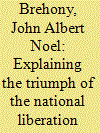

|
|
|
|
|
| Summary/Abstract |
The National Liberation Front (NLF), set up in 1963, took over South Arabia in 1967 to form the People's Republic of South Yemen (renamed the People's Democratic Republic of Yemen – PDRY -- in 1971). I ask how the NLF achieved its goal in such a short period of time, ending the 129-year British presence in South Arabia. The NLF's focus on the armed struggle was the crucial factor but it could not have succeeded without the support of Egypt and a friendly regime in Sanaa, and taking advantage of a growing unwillingness in London to pay the financial and human costs of staying. The NLF understood that the hinterland, long seen as protecting Aden, offered the best route for attacking it. While the final battle would have to be in Aden, the war should start in the protectorates. Violence was accompanied by political work to build an organization to mobilize popular support and defeat rival nationalist organizations.
|
|
|
|
|
|
|
|
|
|
|
|
|
|
|
|
| 5 |
ID:
155113
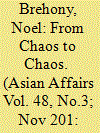

|
|
|
|
|
| Summary/Abstract |
Fifty years after the British departure the future of South Arabia or South Yemen is just as uncertain as it was on 30 November 1967, when the People's Republic of South Yemen (PRSY) came into existence. The old order was swept away in the revolutionary tide of the mid- 20th century to be replaced by a Marxist state. Yet, within less than 23 years the new order was undermined by unresolved issues inherited from South Arabia and led to an ill-prepared union with the Yemen Arab Republic (YAR) in 1990. Today, after over two and half years of war, Yemen is fragmenting and one outcome might be the return of a southern state which will have to confront the same unresolved issues. Are southerners Yemenis or South Yemenis? Can institutions be created to overcome tribal and regional differences with the South? Can a viable economy be created in a country with so few natural resources? This article provides a history of the region and the conflicts of the last 50 years, along with a consideration of the present situation and a discussion of the enduring issues.
|
|
|
|
|
|
|
|
|
|
|
|
|
|
|
|
| 6 |
ID:
046742


|
|
|
|
|
| Edition |
10th ed.
|
| Publication |
London, macmillan Press, 2001.
|
| Description |
xxiv, 822p.pbk
|
| Standard Number |
0333993497
|
|
|
|
|
|
|
|
|
|
|
|
Copies: C:1/I:0,R:0,Q:0
Circulation
| Accession# | Call# | Current Location | Status | Policy | Location |
| 045618 | 953/HIT 045618 | Main | On Shelf | General | |
|
|
|
|
| 7 |
ID:
027233
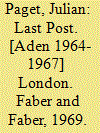

|
|
|
|
|
| Publication |
London, Faber and Faber, 1969.
|
| Description |
276p.hbk
|
| Standard Number |
571087205
|
|
|
|
|
|
|
|
|
|
|
|
Copies: C:1/I:0,R:0,Q:0
Circulation
| Accession# | Call# | Current Location | Status | Policy | Location |
| 005058 | 953.35/PAG 005058 | Main | On Shelf | General | |
|
|
|
|
| 8 |
ID:
151839
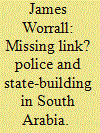

|
|
|
|
|
| Summary/Abstract |
The failure of the state-building project, the insurgency and, to use the famous phrase, Britain's ‘scuttle’, or ignominious withdrawal, from South Arabia have long been the subject of study, receiving attention from many angles and new perspectives. One aspect which has received less attention is the role of policing in the state-building project of the Federation of South Arabia. This article sets out to explore this lacuna by contextualizing the role of policing in state-building and examining the impact of its absence in the case of South Arabia. It is clear that Britain left it very late to attempt the construction of a Federal State in the face of mounting pressures and challenges, and even later to establish a proper Federal Police Service. The article thus examines the argument that the lack of developed policing structures was the missing link in the state-building process before asking if Britain simply left the construction of effective and unified policing structures too late, or whether this was simply an impossible task.
|
|
|
|
|
|
|
|
|
|
|
|
|
|
|
|
| 9 |
ID:
046935
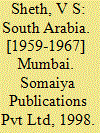

|
|
|
|
|
| Publication |
Mumbai, Somaiya Publications, 1998.
|
| Description |
vii, 166p.hbk
|
| Standard Number |
8170392306
|
|
|
|
|
|
|
|
|
|
|
|
Copies: C:1/I:0,R:0,Q:0
Circulation
| Accession# | Call# | Current Location | Status | Policy | Location |
| 044278 | 953.05/SHE 044278 | Main | On Shelf | General | |
|
|
|
|
| 10 |
ID:
092314
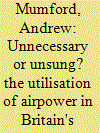

|
|
|
|
|
| Publication |
2009.
|
| Summary/Abstract |
Making extensive use of primary archival documents, this article seeks to explore whether airpower in three of Britain's most significant post-war colonial counterinsurgency campaigns, Malaya, Kenya and South Arabia, was an unnecessary part of British strategy, offering little useful military force due to the futility and strategic damage rendered by offensive bombardment, or whether airpower was indeed an unsung factor that provided operational flexibility through its effectiveness in a supply context, as well as its intelligence role in providing valuable aerial reconnaissance. In all three case studies the role played by the RAF in medical evacuations, in troop drops, in crop spraying during food-denial initiatives, and in providing 'Voice Aircraft' for the propaganda campaign, provide insights into an under-explored component of Britain's politico-military efforts in counterinsurgency in the 1950s and 1960s and suggests that the main strategic value of airpower in counterinsurgency, then and now, lies in its non-kinetic functions.
|
|
|
|
|
|
|
|
|
|
|
|
|
|
|
|
|
|
|
|
|